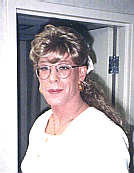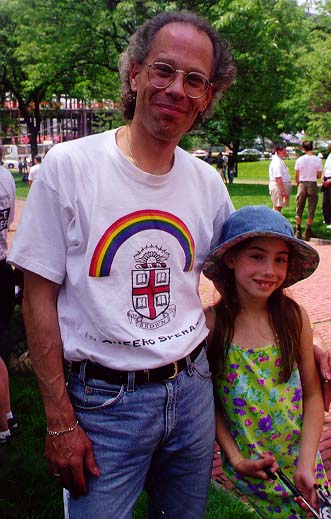


Selected Writings:
Transgender Issues

Being Queer at Brown University
Options:
By Chris Frazer
Not long ago, a friend and I were enjoying the last balmy days of
summer at a sidewalk café on Thayer Street. As we sipped our coffees
and watched passers-by, she remarked that, "Brown University is so
queer!"
Well, I had to agree. Being queer at Brown is decidedly more positive
than my experience at the University of Calgary, where I completed my
first two degrees in history. Brown University has a reputation for
being a queer-friendly campus. In many ways, this image is
well-deserved.
When I arrived in Providence in the summer of 1997, I attended an
orientation for new international graduate students at Brown. I was
pleasantly surprised when Carla Hansen, an associate dean of the
graduate school, told those assembled that, "it's okay to be gay at
Brown."
The atmosphere at Brown is far more open and progressive than anything
I was used to, and it contributed enormously to my coming out as a
gender-queer in the last year. I joined the Queer Grad Body (QGB), made
some great friends, and volunteered to act as co-coordinator for the
group during the 1998-1999 academic year.
Yet I remain painfully aware of the shortcomings and negative aspects
of being queer at Brown. Part of this has to do with the queerness of
being an international student. Another part has to do with the queer
status of transgendered persons at Brown.
You see, when international students arrive at the border they receive
a pamphlet from the INS which lists thirty-three reasons which, if
applicable, disallow their entry into the United States. Among other
categories of undesirable aliens, item number four closes the border if
you are "mentally ill or homosexual." It is easy to see how this might
create a uncomfortable dilemma for many foreign students at Brown.
But whether you are a foreign student or not, being transgendered (or
gender-queer) is like living in a twilight zone.
Let me illustrate with an example. Last winter, when I discussed my
gender identity with one of my professors, he assumed that I was
protected under the provisions of Brown's non-discrimination policy.
But I'm not.
According to its policies, the university "does not discriminate on the
basis of sex, race, color, religion, age, handicap, status as a veteran,
national or ethnic origin, or sexual orientation." But nowhere does
Brown offer protection against discrimination on the basis of gender
identity.
I cannot say that I have been denied funding, scholarships, or work
because of my gender identity. Nor have my grades suffered. Moreover,
my personal and academic relations with faculty and peers seem to be
excellent. I have no doubt that I benefit from a queer-positive
environment at Brown.
So, is there a problem? Well, the answer is "yes."
We are the least visible queers at Brown, and our low profile is not
just a question of numbers. At issue is the inescapable uncertainty and
tension that comes with living and studying in an environment where our
security and well-being continues to depend on individual good faith
and voluntary tolerance, rather than on an explicit policy of equal
rights and acceptance. I am convinced that the absence of protection
for gender-queers contributes to the closeting of my transgender
colleagues.
But there is more to it than that. What are the consequences of
transitioning at Brown for a transsexual, either male-to-female or
female-to-male? What about the case of transsexuals who choose to
forego or undergo sex-reassignment surgery (SRS)? What about
gender-queers who cross "conventional" gender roles on either a
part-time or full-time basis?
Where are the university services to help transgender students deal
with their gender identity and integrate into campus life? What are
the implications for living in a residence, dealing with friends and
family, attending class, working as a teaching assistant, or having
safe access to washrooms? What are the potential dangers of harassment
or assault? Where are the mechanisms to handle grievances?
These are just a few of the issues that were placed before the
University Committee on Lesbian, Gay and Bisexual Concerns last year
when two transgender activists urged the committee to recommend the
inclusion of gender identity to Brown's non-discrimination policy.
However, the university has not amended its policy, even though a
majority of Brown undergrads voted in support of transgender
protection in a referendum.
Nor was it all that encouraging when our new university president
Gordon Gee failed to attend a forum on being gender-queer at college,
organized during Pride Month (March 1998) by the LGBTA at Brown. Gee
had accepted an invitation, but was a no-show.
Are we that marginal and unimportant? Or is it a matter of sheer
ignorance reinforced by our invisibility? In either case, the fact
remains that coming out at Brown is still a hazardous and uncertain
exercise for transgendered people.
The queer groups at Brown have been a great source of support. Their
openness and inclusion of transgendered students makes all the
difference in the world. And it must be said that we have friends and
supporters within the campus administration. But it is now time for
Brown gender-queers to become even more organized and visible.
That's why a support group for trans/gender-queers formed this fall at
the university. It is diverse collection of people, but we agree on
thing: while we belong to the queer community, our queerness is
profoundly influenced by the issue of gender identity. It is up to us
to claim our own space at Brown, and to create our own vehicles to
address our needs and concerns.
Rhode Island's Lesbian and Gay Newsmagazine
November 1998 The university includes sexual orientation in its non-discrimination
policy, and it has an official committee to deal with lesbian, gay and
bisexual concerns. Queer topics are included in the curriculum, and
students can choose to concentrate on the study of sexuality and
society. Moreover, both undergraduates and graduates have separate
queer student groups - the Queer Grad Body and the LGBTA - to serve
their needs and interests.
The university includes sexual orientation in its non-discrimination
policy, and it has an official committee to deal with lesbian, gay and
bisexual concerns. Queer topics are included in the curriculum, and
students can choose to concentrate on the study of sexuality and
society. Moreover, both undergraduates and graduates have separate
queer student groups - the Queer Grad Body and the LGBTA - to serve
their needs and interests.
The photo with the text shows myself and my oldest daughter, Rachelle, at the Rhode Island State House during the 1998 Pride Rally.

This page was last  on January 18, 1999
on January 18, 1999

Your comments and suggestions are welcome!